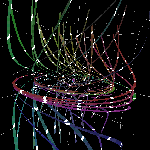 Takehomequiz due 28apr99: first page and
the second page .
Takehomequiz due 28apr99: first page and
the second page .
Class notes of 31mar.
Homework and quiz as per 24 mar
Class notes 3 mar, and
22feb.
Syllabus and homework announced 17feb.
Notes and homework 5feb
on the Inverse Function Theorem and geometrical applications.
Notes and homework on the
Imlicit Function Theorem 1feb.
Reply on the late homework policy.
Reply to a query 26jan.
Current homework assignment.
Notes on Lecture 2, 22jan99.
Reply to a query 23jan.
Notes on Lecture 1, 20jan99.

This section will use the traditional Kaplan text supplemented by class notes, web notes, outside reading and computer labs. I quote from the introduction to Schey's paberback I used last year and which is still a useful supplement to the course.
"...the subject of vector calculus is presented in the context of simple electrostatics. We follow this procedure for two reasons. First, much of vector calculus was invented for use in electromagnetic theory and is ideally suited to it. ... Second, we have a deep seated conviction that mathematics -- in any case some mathematics -- is best discussed in a context which is not exclusively mathematical."
To which I may add that a third reason is that every educated engineer and scientist should some time or other learn the beauty of this century old discipline and work with it in the manner its originators intended them to.
Since only small number of the students pre-registered for this section would benefit especially from having electrostatics as the principal context, we will take a more inclusive approach, with emphasis on dynamics of fluids in general. Therefore we'll use the standard desk reference and universal sourcebook by Wilfred Kaplan. First published in 1952, this classic has been the Prof. Kaplan's lifelong project.
The first hourly is 12feb99. The midterm is on Wednesday, 10mar99. Semester project proposal is due Friday, 26mar99; the project is due Friday, 23may99. The final is at 8am, Friday, 14may99. Homework is required. Quizzes will be announced. There is a computer lab component to the course. Additional information concerning homework, tests, field trips and special events will appear on this webpage.
[Here]
are the webpages for my course last year.